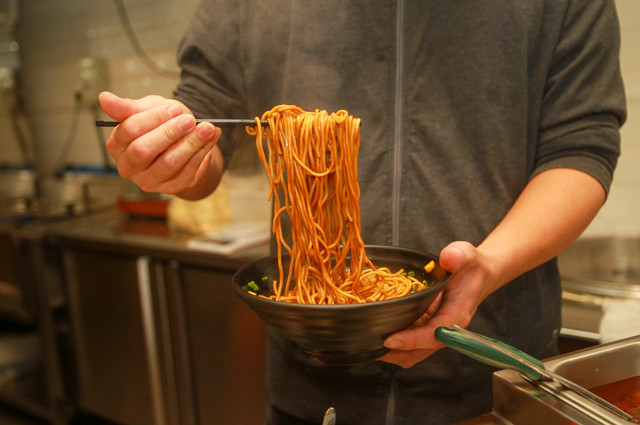People regain appetite for life

[Photo/IC]
Guozao (eating breakfast) is a big deal for people in Wuhan, capital of the central province of Hubei.
After the lifting of the 2020 citywide lockdown aimed at containing the COVID-19 epidemic, the first thing many people chose to do was celebrate by having hot and dry noodles at local restaurants.
Now, such restaurants are packed with locals and tourists every morning. Unlike visitors, who deem it necessary to find a seat to have breakfast, Wuhan people often choose to pick up the noodles in a paper bowl and eat them on their way to work.
Meanwhile, restaurant staff are struggling to accelerate the process of making shaomai, a steamed dumpling with thick dough on the top, to keep up with demand. The smells escaping from the steamers into the streets serve as the best advertisement for the restaurants.
For people in Wuhan, which was the first place in China to see an outbreak of COVID-19 at the end of 2019 and in early 2020, the hustle and bustle of the city is back, and people's lives have gradually returned to normal.
Like most cities in China, Wuhan experienced an infection peak around late December after the country gradually began easing the COVID-19 curbs as the less pathogenic but highly transmissible Omicron strain became dominant.
Unlike during the first outbreak in Wuhan, medical workers now have a clear understanding of the virus and access to better medical resources, so the infection peak passed smoothly, according to Hu Ke, director of the second department of respiratory and critical care medicine at the Renmin Hospital of Wuhan University (Hubei General Hospital).
"After that, I believe the city has stepped out of the shadow of the COVID-19 epidemic, but how people have recovered both physically and mentally is even more important," he said.
Hu has been following 36 babies who were born at the hospital in 2020. Their mothers were all COVID-19 patients who later recovered. "It's very rewarding to see that both the babies and their mothers are very healthy," he said.
Meanwhile, continuous support must be offered to patients still living with the symptoms of long COVID-19, including shortness of breath, debilitating fatigue or malaise, an elevated heart rate, sensitivity to light, exercise intolerance and insomnia, as well as mental health issues, he added.
Wu Zhifeng, president of the Wuhan Sports Center, which was used as a makeshift hospital in 2020, said it's obvious that local people have started to attach greater importance to health, so the number using sports facilities has increased significantly compared with the pre-epidemic era. Furthermore, people are taking a greater interest in outdoor activities.
"After experiencing the epidemic, many people have changed their way of life and are trying to stay healthy. Our facilities, such as running tracks, soccer fields and badminton courts, are always packed in the evenings and on weekends," Wu said.

